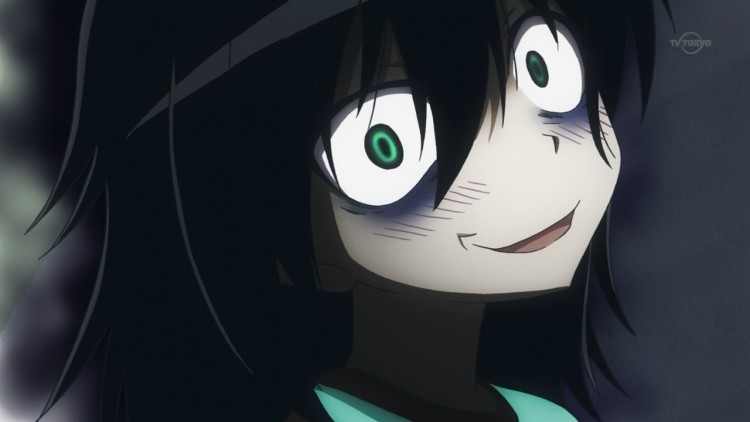I made a remark earlier in the year that this has been one of the best years for anime in a while. While normally each successive anime season is a task of plodding through series after series in search of that one or two that will catch my attention long enough to sit a review for, this year I’ve actively had to limit what I’ve been watching, all in the name of time management. For the first time since the Summer of 2011, I’ve juggled four series simultaneously…and I’ve been loving it.
Back in the Spring, I attempted to do a full review of the 6 (!) shows I was actively viewing. Ultimately, three were dropped, and I never gave proper space to Gargantia. Summer 2013 started out much the same, with a full queue of shows: from the moe slice of life “Love Lab” to the distinctly shounen “Blood Lad,” the quirky “Uchouten Kazoku” and hilarious “Watamote.” Two of those shows there didn’t last beyond 4 weeks. The other two joined the still-amazing Attack on Titan in my weekly rotation.
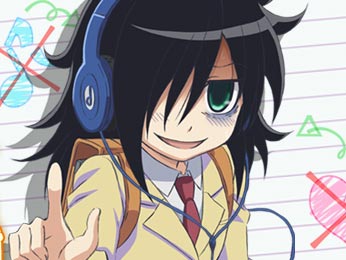 Much discussion has been made about “Watamote” in recent months, owing to the extremely self-referential nature of the show, its awareness of “a certain segment” of the populace, and it’s often brutal depiction of social anxiety. One Kotaku review went so far as to call it “the most mean spirited anime” he has ever watched, a criticism that definitely holds weight when the series is viewed by those unaware of the “otaku stereotype,” or those with particular sympathies for bullying. Over at Beneath The Tangles, Charles gave it a much more sympathetic look, but still highlighted some of the issues surrounding the utterly deluded Tomoko.
Much discussion has been made about “Watamote” in recent months, owing to the extremely self-referential nature of the show, its awareness of “a certain segment” of the populace, and it’s often brutal depiction of social anxiety. One Kotaku review went so far as to call it “the most mean spirited anime” he has ever watched, a criticism that definitely holds weight when the series is viewed by those unaware of the “otaku stereotype,” or those with particular sympathies for bullying. Over at Beneath The Tangles, Charles gave it a much more sympathetic look, but still highlighted some of the issues surrounding the utterly deluded Tomoko.
This reviewer still enjoys the show, despite those valid points. What creates Watamote’s appeal for the many who watch it is that same awareness- we can see a bit of ourselves in Tomoko (or people we might know and be friends with), and understand that the series is playing up a strong parody of those traits it espouses. Yes, I said parody, which is exactly what the series is. It’s not meant to be taken especially seriously. It is a look at some of the extreme views that are levied against “otaku,” cloaked in the trappings of a slice-of-life comedy. While the characterization of its “eccentric” lead (and eccentricity is a huge theme this season) borders on slander, the intent of the series is not to demonize or demoralize the behaviour, just to make apparent the activities, and point out some of the emotions behind it. Or at least that’s what I am getting from it.
Fortunately, not all series this season take such a stance on eccentricity. Easily the breakout series of the summer, and one that would easily fly under the radar of the more general anime fan, Eccentric Family mixes a deep understanding of Japanese folkore with elements of the slice of life genre to create something refreshing, and unique among a season full of refreshing and unique takes on classic genres.
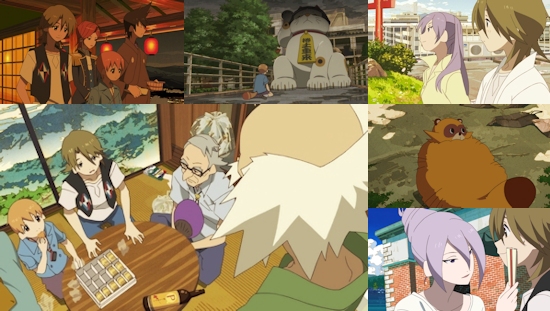 Set in modern-day Kyoto, the series revolves around the (mid)adventures of a young tanuki, Shimogamo Yasaburou. The middle child in a family of so-called “idiot blooded” yokai who spend most of their time in human form, he spends his days wandering the city, interacting with the cranky “professor” Akadama (a tengu who lost his ability to fly), helping his youngest brother deal with bullies, evading the machinations of rival tanuki clans, and crossing paths with the crafty human, Benten, who may or may not be trying to make him into a stew.
Set in modern-day Kyoto, the series revolves around the (mid)adventures of a young tanuki, Shimogamo Yasaburou. The middle child in a family of so-called “idiot blooded” yokai who spend most of their time in human form, he spends his days wandering the city, interacting with the cranky “professor” Akadama (a tengu who lost his ability to fly), helping his youngest brother deal with bullies, evading the machinations of rival tanuki clans, and crossing paths with the crafty human, Benten, who may or may not be trying to make him into a stew.
The generally humorous and lighthearted tone of the series is counterbalanced by a meta-plot involving the death of Yasaburou’s father years earlier, and discovering both how and why the great elder tanuki managed to get himself eaten. While visibly carefree in his day-to-day, Yasaburou is still shaken up by the loss of his father, which in turn causes him to poke his nose where it doesn’t belong, earning him the “wrath” of both his flamboyant mother, and straight-laced brother, who himself is trying to inherit the mantle of community leader their father once wore so proudly.
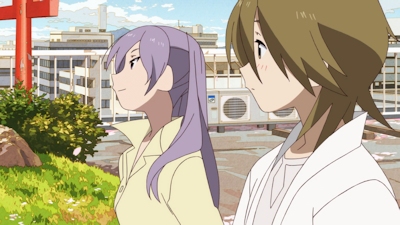 Eccentric Family succeeds admirably in telling their tale. Rather than being bogged down by unnecessary details on heady drama, the show balances the serious themes of love and loss alongside some of the truly crazy shenanigans the Shimogamo family perpetrates. From floating parlours to drunken tengu, the show moves along at an appropriate pace, giving the source material and heavy meta-plot equal attention throughout. Yasaburou himself is easily the most relatable member of his family, mixing in the trickster tendencies found in most tanuki legends with a healthy dose of ambiguity as the story progresses. Even when he’s being serious, you can see the twinkle in his eye and the mischief in his actions.
Eccentric Family succeeds admirably in telling their tale. Rather than being bogged down by unnecessary details on heady drama, the show balances the serious themes of love and loss alongside some of the truly crazy shenanigans the Shimogamo family perpetrates. From floating parlours to drunken tengu, the show moves along at an appropriate pace, giving the source material and heavy meta-plot equal attention throughout. Yasaburou himself is easily the most relatable member of his family, mixing in the trickster tendencies found in most tanuki legends with a healthy dose of ambiguity as the story progresses. Even when he’s being serious, you can see the twinkle in his eye and the mischief in his actions.
These become even more pronounced when he interacts with the mysterious Benten, a woman who presents a constant danger not only to the tanuki, but to Professor Akadama. While not a villain per se, the human woman woman (who is named after one of the powerful water-associated kami, Benzaiten) is as ruthless as any other, hiding her motivations while keeping her intentions plainly clear. She has a taste for tanuki, trickery and control, and she wields all three to perfection, even in the early episodes.
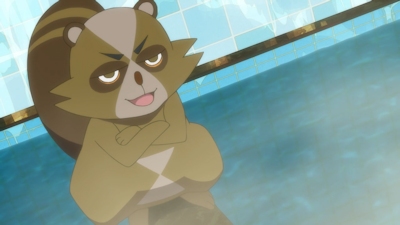
At its core, Eccentric Family lives up to its moniker, however- its a show about family, and how they stick together during the hard times. Not unlike the latter seasons of the landmark 70s series “Good Times,” this is a show defined by loss, and how each character perceives and deals with it (and deal with it differently, they all do). Yasaburou, for all his wit and good-natured trickery, is also self-destructive at times, placing himself in dangerous situations where his safety is in doubt. His elder brother, Yajirou, runs away from the world because he cannot come to grips with what he blames himself for doing, and eldest brother Yaichiro seeks to become the father he lost, regardless of whether it is for the right reasons.
Eccentric Family is anything but cliche, which is the show’s strongest attribute. With just enough tension to keep the plot moving from episode to episode, and intriguing characters throughout, it highlights many of the “hidden traits” of Japanese family structure, and the abilities of the country’s most visible folkloric creature. A show like this doesn’t come along very often, and should be appreciated for what it accomplishes.
Finally, eccentricity is on full display in the ridiculously magnificent “Gifuu Doudou,” a “dazzling Sengoku period drama” (that is the exact description made during the opening) about two samurai known for their “odd behaviour” and prowess on the battlefield. Set during the warring states period in Japan, the story follows best friends/retainers Naoe Kanetsugu and Maeda Keiji- two Kenichiro lookalikes with unnecessary muscle mass and a flair for acting outrageously both on and off the battlefield, as they spend a night drinking sake by moonlight and recounting adventures from their younger years.
What makes Gifuu Doudou such a good time (apart from the leads, who are both intentionally crazy, and unintentionally hilarious) is the peppering of details from Japanese history thrown about in the story. Seriously, this show is a history lesson all its own, but rather than outright explaining the “whos” and “whats” of that dramatic period of warfare, it simply makes the viewer aware of the players and the campaigns, and offers enough motivation to look into them some more. The characterizations around such well-known names like Oda Nobunaga (who gets one helluva introduction) and Toyotomi Hideyoshi (who has a definite sniveling air about him) fit well with the historical descriptions, and make the show feel more like “Sengoku Basara” than “Seven Samurai.” Just watch Keiji play his biwa like a rock guitar before slicing some mook’s throat, and you will “get” the entire point.
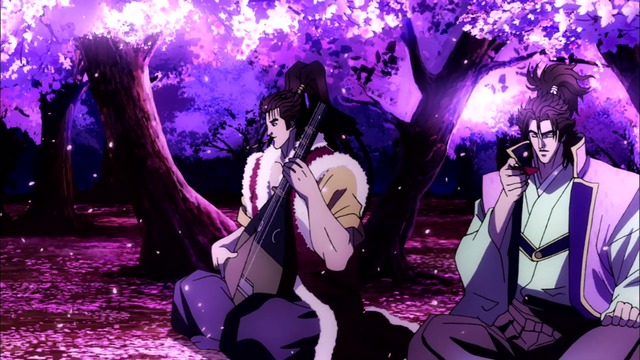 While I was ready to write this show off after a pilot that made me exclaim “what the fuck was that?” aloud on a bus ride from NY-DC back un July, it grew steadily on me with promises of sweeping battles and intriguing characters, which it delivers on both fronts. While firmly situated on the side of the bizarre, Gifu Doudou nonetheless is a fun time, and a wonderful complement to a night’s viewing that also includes both aforementioned series.
While I was ready to write this show off after a pilot that made me exclaim “what the fuck was that?” aloud on a bus ride from NY-DC back un July, it grew steadily on me with promises of sweeping battles and intriguing characters, which it delivers on both fronts. While firmly situated on the side of the bizarre, Gifu Doudou nonetheless is a fun time, and a wonderful complement to a night’s viewing that also includes both aforementioned series.


